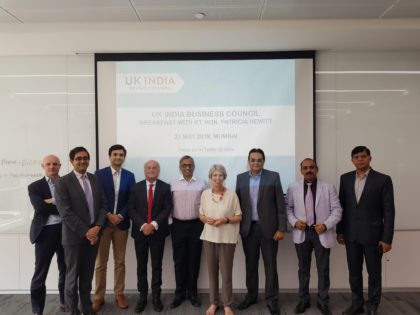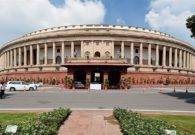Looking to the next Government of India – UKIBC Mumbai Roundtable with Rt.Hon Patricia Hewitt
What are businesses looking for in the next Indian Government? This was the question on the table in a UKIBC breakfast roundtable with the Rt.Hon Patricia Hewitt for our leading members based in Mumbai.

As the UK India Business Council’s former Chair, the current Chair of the Oxford India Centre for Sustainable Development’s Advisory Board, an Advisor to the UK Government’s Board of Trade, and a former Secretary of State for Trade and Industry, Patricia is no stranger to anticipating and analysing the state of UK-India relations.
The No Big Bang Theory
There was a consensus around the table that regardless of the outcomes of the election, the Government should not seek to introduce more major reforms and big schemes.
The current economic growth of 6.5%, accompanied by good macroeconomic fundamentals, is a notable achievement given the patchy picture five years ago. This can be consolidated though through a focus on implementing the reforms that were introduced over the last five years and making sure they are functioning effectively.
Chief among these is pursuing ease of doing business improvements, both at the central and State levels.
What do we mean by ease of doing business reform?
Corruption – The roundtable highlighted that anti-corruption measures have so far worked well and are perhaps one of the previous Government’s biggest successes. This is reflected in UKIBC’s fourth annual ‘Doing Business in India: The UK Perspective’ report published in November which found perceptions of corruption to have halved since our first report was launched shortly after Modi first came to power.
However more needs to be done by the next Government to ensure that this drive spreads to all layers of Government both at the Union and State levels.
Banking and Finance – Likewise, there is a greater need for public accountability more generally. This is particularly the case in India’s banking system where bad debts and distressed assets will need to be dealt with in a fair and transparent way by the next Government if it is to restore full trust in the sector.
Without attention, these non-performing assets could become a systemic problem for many years to come.
Though the Insolvency and Banking Code (IBC) has so far proved a success in pushing the issue of bad debts out in to the open, resolving these issues have been harder with courts clogged up with cases and unable to meet deadlines set out in the legislation. This is only compounded by a lack of commercial courts meaning that people are using the civil courts. Here, even arbitration is proving poor value for money as an alternative, frequently taking too long and costing anywhere up to 40% of the contract in question.
Bureaucracy – Despite significant digitalisation drives which have greatly improved both business and citizen’s interactions with Government, day-to-day bureaucracy still presents a huge challenge which needs to be addressed by the next Government.
Setting up a new business in India is still very complicated, with winding a company up even more so, sometimes taking up to two years. Further digitalisation will greatly enhance trust, transparency, improve efficiency, and help with compliance. Standard approaches across States would also greatly simplify matters and encourage business expansion.
Skills and Education – Underpinning the ability to enhance both governance and business however is ensuring India produces the immense number of skilled graduates needed in the near future. As outlined in UKIBC’s report ‘Beyond the Top 200’, the current education system requires reform.
Several of our members expressed concern that acute shortages of skilled staff are acting as a huge barrier to expansion and investment. Indeed, where investment is made, it is frequently in training and retraining their graduate recruits.
Where high-quality graduates do emerge, they frequently look for opportunities abroad, depriving India of their skills. This will pose significant challenges in the healthcare sector where the implementation of Ayushman Bharat will require doubling the number of current healthcare professionals currently operating in India.
Whilst continuing anti-corruption drives, and prioritising reform in banking and finance, bureaucracy, and education were key asks of leading businesses around the table, there are many other major reforms waiting for uptake by the new Government.
This includes addressing the issues of inaccurate and unreliable data, trusting and empowering truly independent regulators to drive reform as experts in their industry, and starting to address the long-ignored issued of labour market reforms where the introduction of a living wage could go a long way to standardising employer-employee relationships.
No small asks from business, but with the right drive and ambition from India’s next Government, India will truly be on track to become a global 21st century superpower.







